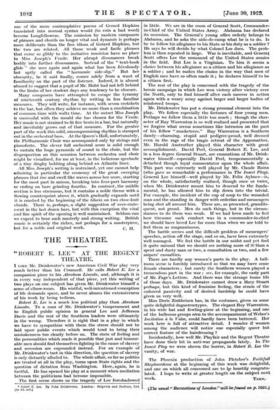THE THEATRE.
"ROBERT E. LEE ": AT THE REGENT THEATRE.
I LIKE Mr. Drinkwater's new American Civil War play very much better than his Cromwell. He calls Robert E. Lee a companion piece to his Abraham Lincoln, and, although it is in every way independent of that piece, yet this writing of two plays on one subject has given Mr. Drinkwater himself a sense of elbow-room. His wistful; well-intentioned conception of life demands space, and he never abuses the extensiveness of his work by being tedious.
Robert E. Lee is a much less political play than Abraham Lincoln. To a man of Mr. Drinkwater's temperament and to English public opinion in general Lee and Jefferson Davis and the rest of the Southern leaders were ultimately in the wrong. Therefore it is right that in a play in which we have to sympathize with them the stress should not be laid upon public events which would tend to bring their mistakenness too clearly before us. The state of feeling and the personalities which made it possible that just and honour. able men should find themselves fighting in the cause of slavery and secession are expounded instead. For an example of Mr. Drinkwater's tact in this direction, the question of slavery is only distantly alluded to. The whole affair, so far as politics are treated at all in the play, turns upon State rights and the question of dictation from Washington. Here, again, he is tactful. He has opened his play at a moment when mediation between the politicians had become impossible.
The first scene shows us the tragedy of Lee foreshadowed
• Robert E. Lee. By John Drinkwater. London : indgaick and Jackson, Ltd. L3a. net.] in little. We are in the room of General Scott, Commander- in-Chief of the United States Army. Alabama has declared its secession. The General's young office orderly belongs to Alabama, and he asks the aide-de-camp what he is to do. Is he to follow his allegiance to his State or his duty as a soldier ? He says he will decide by what Colonel Lee does. The prob- lem is then repeated in large. War is inevitable, and .General Scott offers Lee the command of the United States armies in- the field. But Lee is a Virginian. To him it seems a choice between his allegiance as a' citizen and his allegiance as a soldier ; and he makes the choice in the way that men of English race have so often made it ; he declares himself to be a citizen first.
The rest of the play is concerned with the tragedy of the heroic campaign in which Lee won victory after victory over the North, only to find himself after each success in action again with a weary army against larger and larger bodies of reinforced troops.
Mr. Drinkwater has put a• strong personal element into the play. We follow especially the fortunes of four young men. Perhaps we follow them a little too much ; though the char- acter of Ray Warrenton is so well realized and presented that we forgive what seems sometimes like intrusion on the part of his fellow " musketeers." Ray Warrenton is a Southern dandy—charming, stupid and pedigree-proud, well dressed even in the rags of the tragic retreat of the Appomattox. Mr. Harold Anstruther played this character with great accomplishment. David Peel, General Robert E. Lee, and in a less degree General Stuart, arc emanations of Mr. Drink- water himself—especially David Peel, temperamentally a detached though loyal commentator upon the whole affair. This part was extremely well played by Mr. Claude Rains (who gave so remarkable a performance in The Insect Play). General Lee himself—well played by Mr. Felix Aylmer—is, on the whole, satisfactorily realized, though once or twice, when Mr. Drinkwater meant him to descend to the funda- mental, he has allowed him to slip down into the trivial. For example, the incident of the cup of soup to the wounded man and the standing in danger with orderlies and messengers being shot all around him. These are, as presented, grandilo- quent, not grand. Men do such things, but in the circum- stances to do them was weak. If we had been made to feel how tiresome such conduct was in a commander-in-chief we should'have loved' Lee far more than when we are told to feel them as magnanimous.
The battle scenes and the difficult problem of messengers' speeches, action off the stage, and so on, have been extremely well managed. We feel the battle in our midst and yet find it quite natural that we should see nothing more of it'than a spent and dusty man or two, a consultation or two, and a few snipers' casualties.
There are hardly any women's parts in the play. A ball- room scene is forcibly introduced so that we may have some female characters ; but surely the Southern women played a tremendous part in the war ; see, for example, .the early part of Mr. Page's Letters. And there was the strange home life of those days. Mr. Drinkwater cannot draw a Mary Stuart perhaps, but this kind of feminine feeling, the strain • of the enforced passivity and of desired hardship he could have given us very well.
Miss Doris Zinkheisen has, in the costumes, given us some quite delightful daguerreotypes. The elegant Roy Warrenton, in his wide hat and fowling-piece at the beginning, and one of the ballroom groups seen to the accompaniment of Weber's Invitation a la Valse, could hardly have been bettered; Her work here is full of attractive detail. I wonder if women among the audience will notice one especially queer but correct feature of the hairdressing ?
Incidentally, how well Mr. Playfair and the. Regent Theatre have done their bit' in anti-war propaganda lately. In The Insect Play we were shown the horror, in Robert E. Lee the vanity, of war.










































 Previous page
Previous page